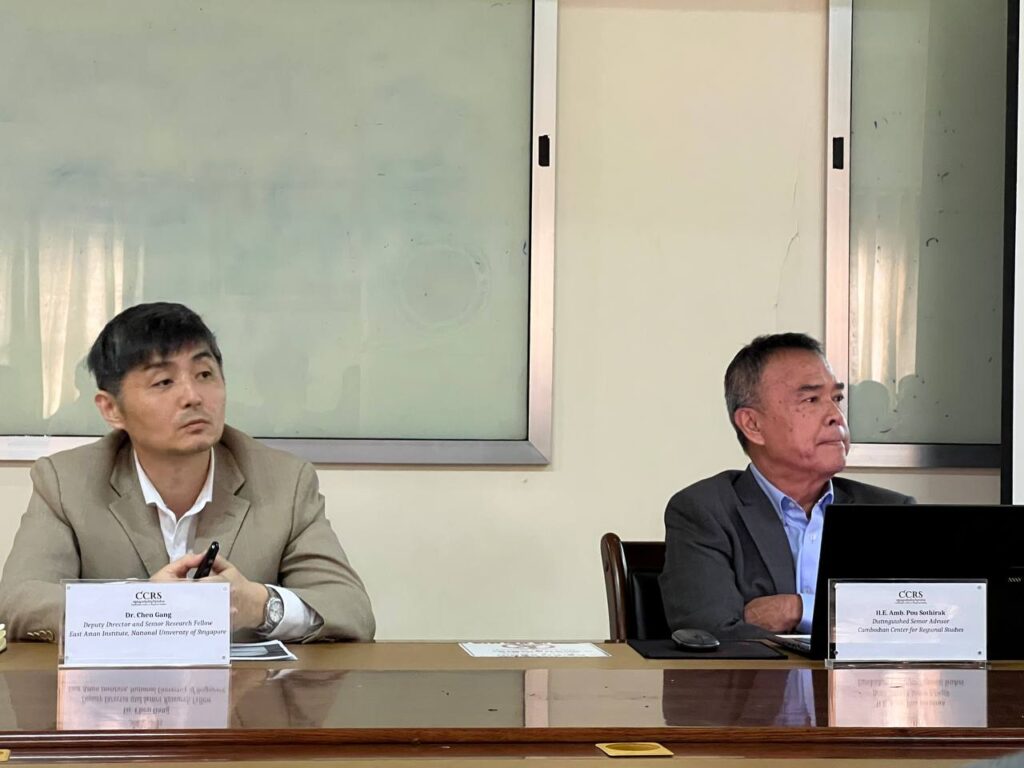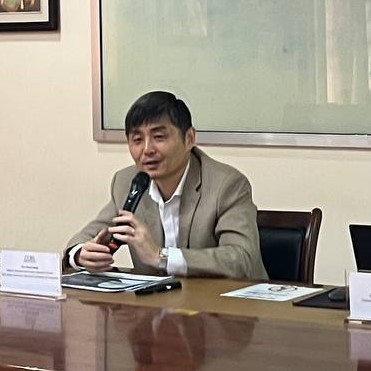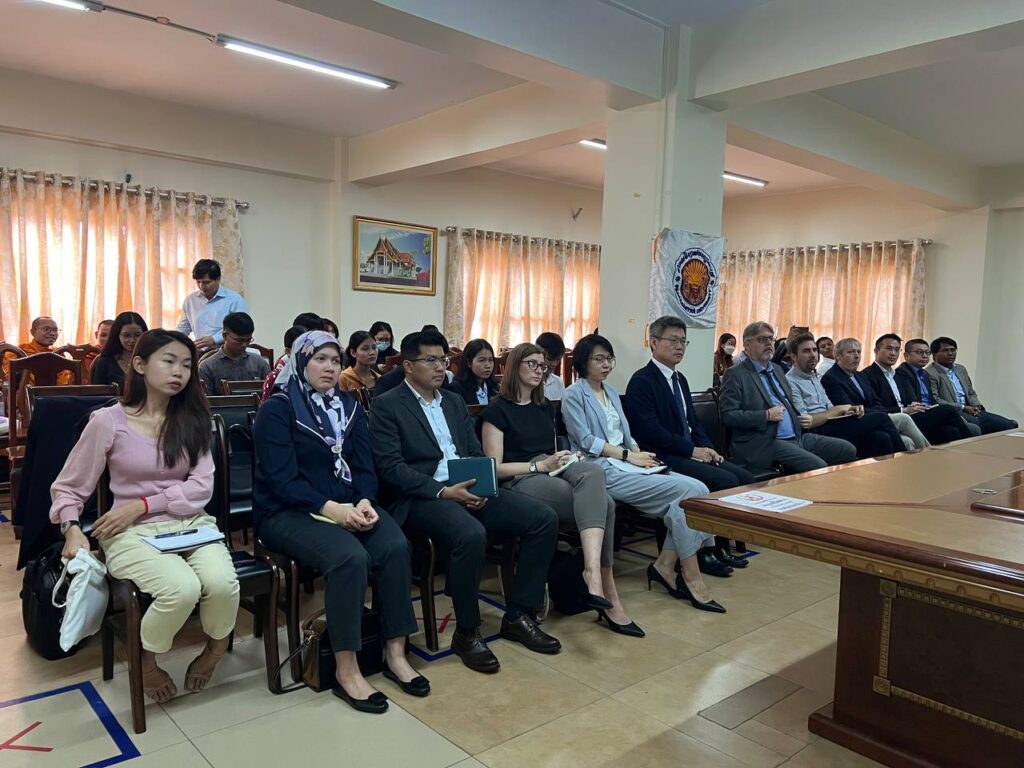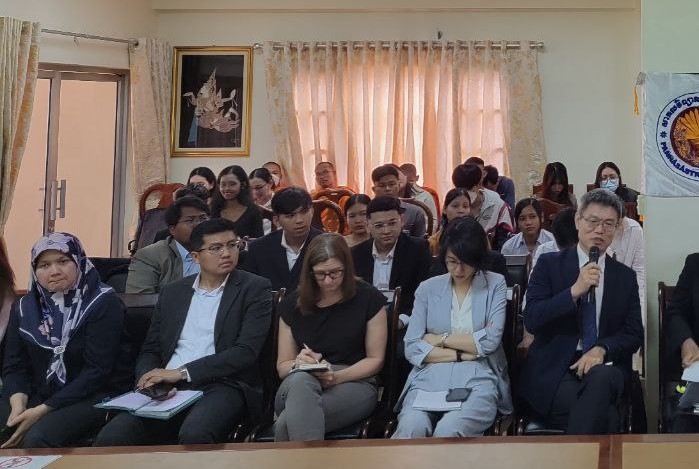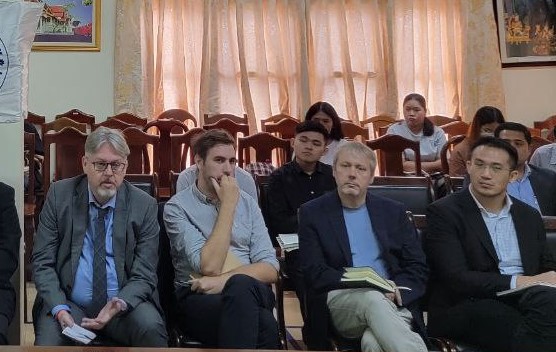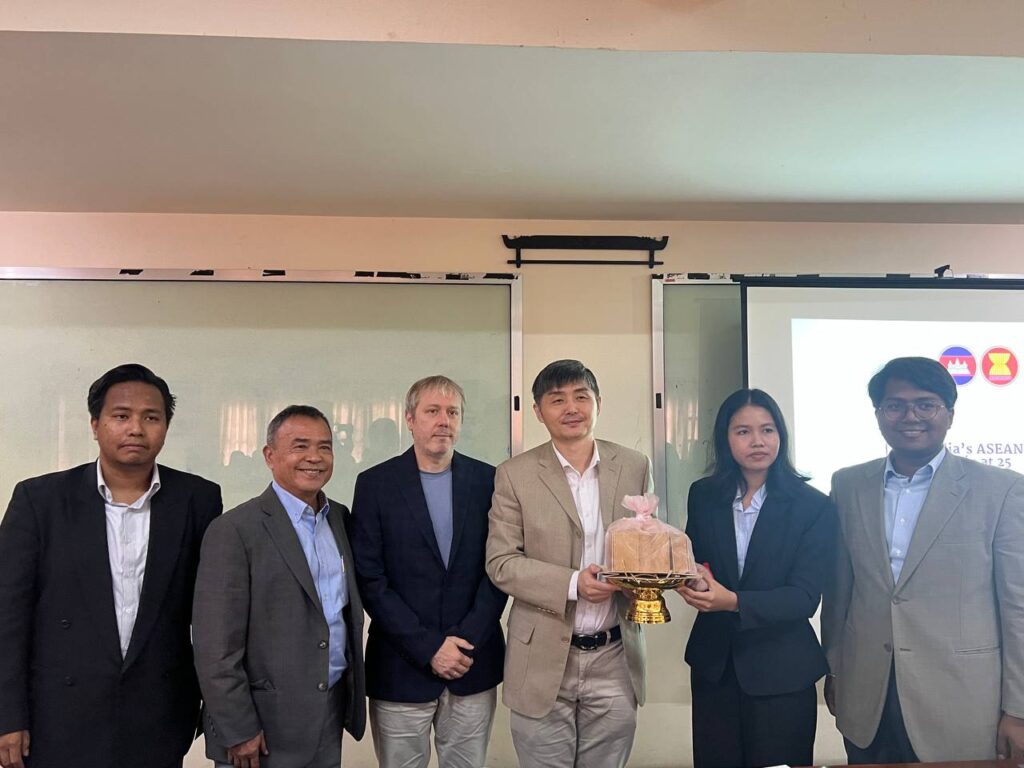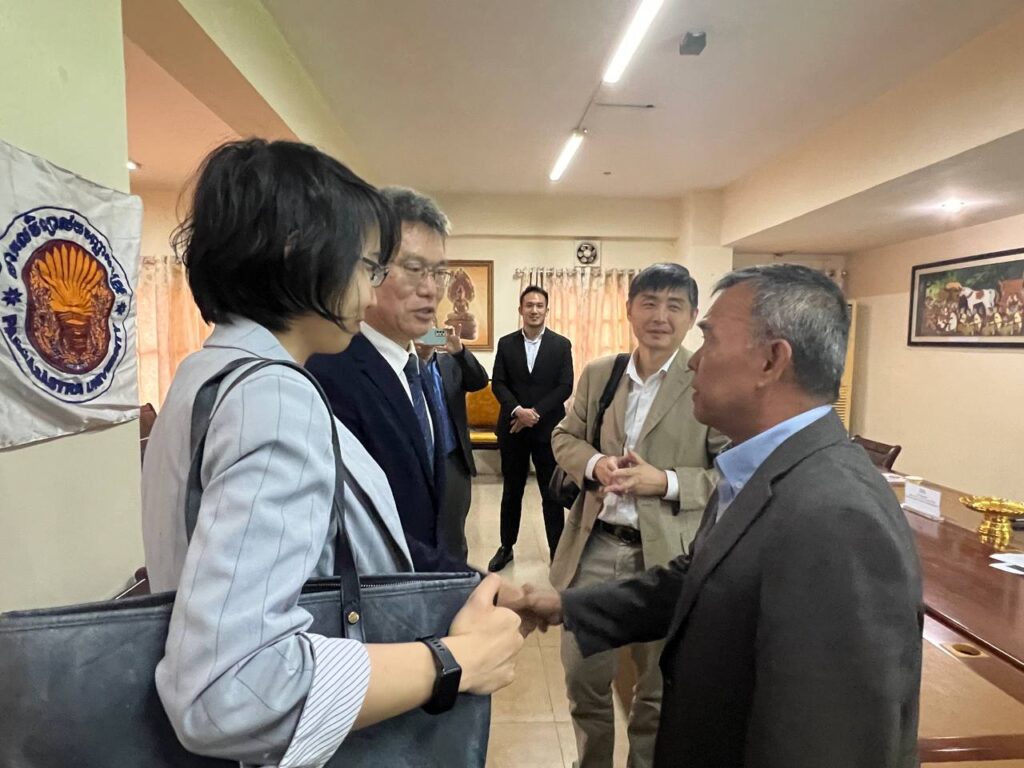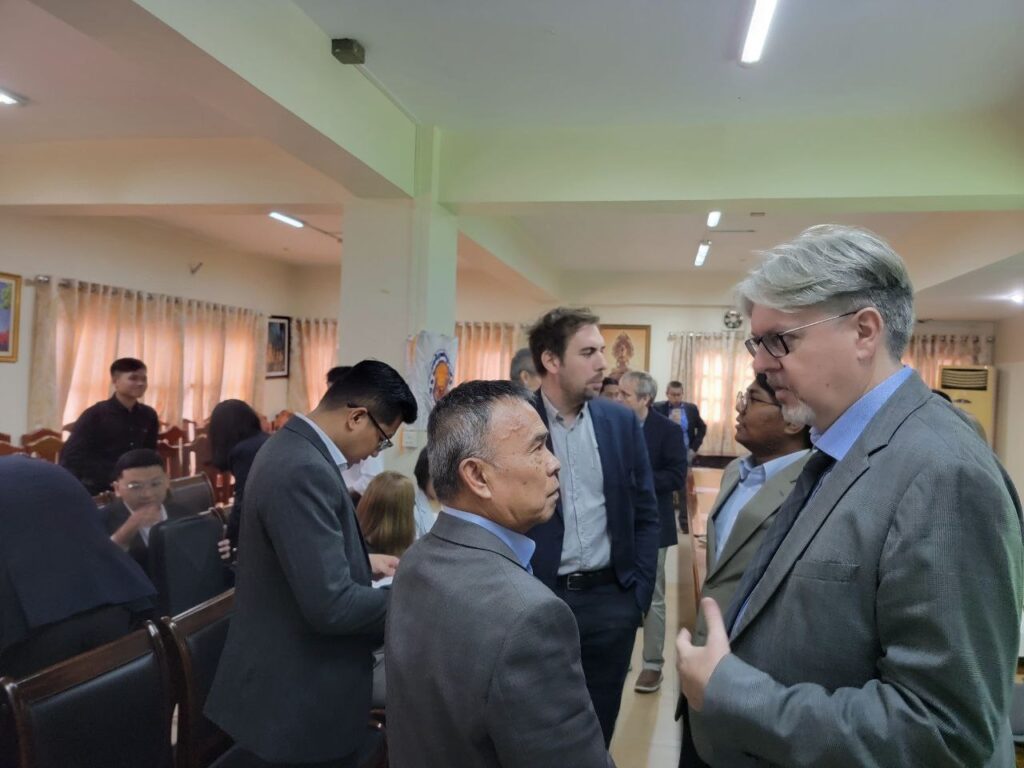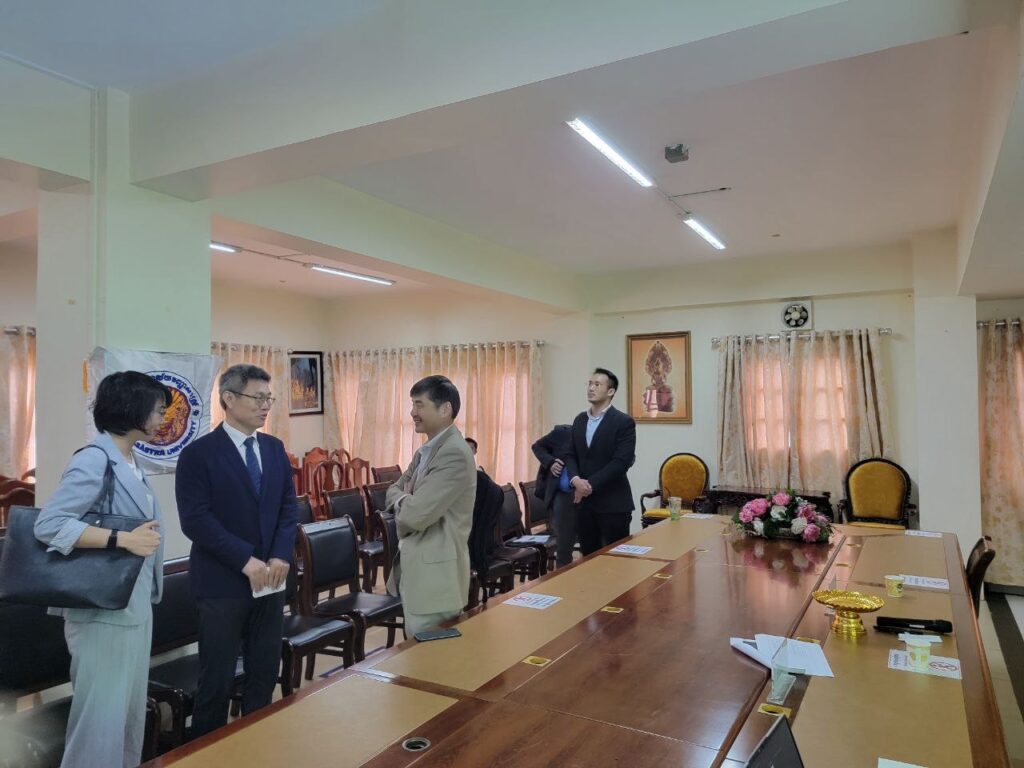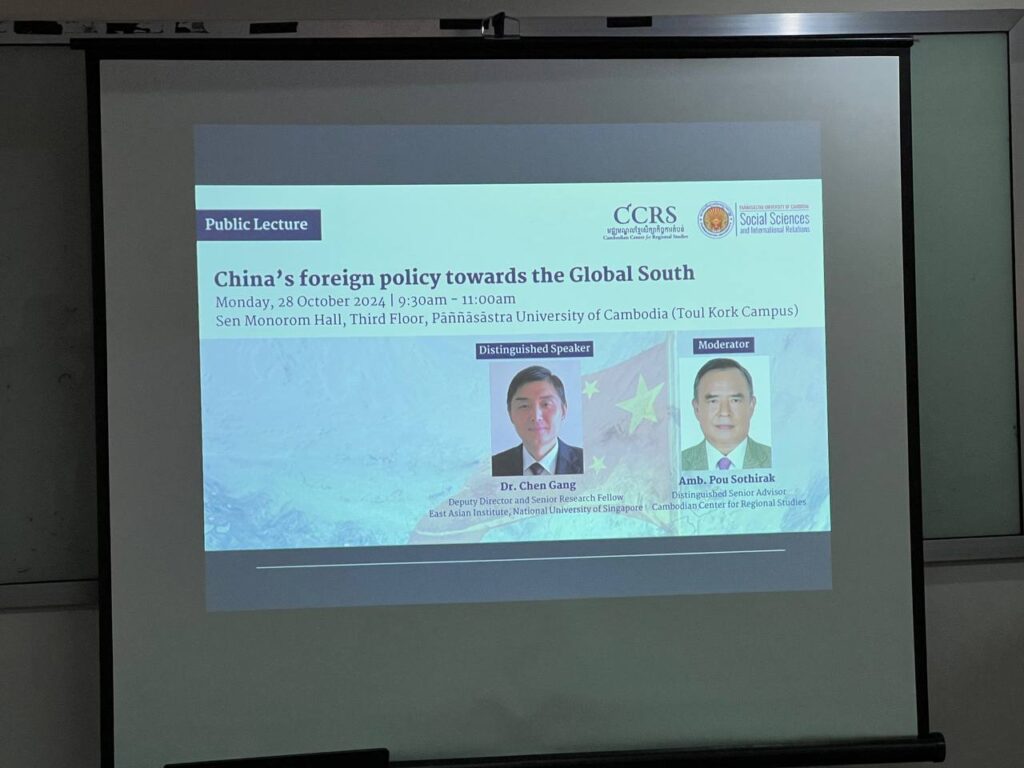On 28 October 2024, from 9:30-11:00am, at PUC’s Toul Kork Campus, CCRS organized a public lecture entitled “China’s Foreign Policy Towards Global South” by Distinguished Speaker, Dr. Chen Gang, Deputy Director and Senior Research Fellow, East Asian Institute of the National University of Singapore. More than 40 participants attended the lecture, comprising mainly of members of diplomatic corps from Embassies of China, France, UK, Brunei, Malaysia, Singapore, and the Philippines, along with CCRS researchers and PUC students.
Mr. Him Raksmey, Executive Director of CCRS, welcomed all participants and expressed sincere appreciation to delegation from the EAI for accepting CCRS’ invitation to openly engage young university students of Cambodia on such excellent subject of interest.
At the opening, Amb. Pou Sothirak, Distinguished Senior Advisor to CCRS, extended his warm welcome to all participants who joined the lecture, and expressed deep appreciation to Dr. Chen Gang, for accepting to speak on this important topic. He mentioned that audiences today are pleased to have the opportunity to listen to the distinguished speaker who is a Senior Executive and Researcher from EAI, a prestigious and an autonomous research institute and think tank of the National University of Singapore whose focuses are on the political, social, and economic developments in East and Southeast Asia. This subject of this lecture is an asset for Cambodian university IR students to learn and appreciate the extended influence of China’s foreign policy towards the Global South, as well as in the world stage. He asked the participants to pay attention and engaged as much as possible with CCRS’ featured guest today. Amb. Pou Sothirak, explicitly noticed the important presence of eminent representatives from the diplomatic corps, especially the two officials from Chinese Embassy in Phnom Penh. This the first time that CCRS has the privilege to welcome Chinese diplomats to our public lecture series.
Dr. Chen Gang delivered a stimulating presentation on China foreign policy, focusing on the peaceful ideological transformation of the Chinese Communist Party from Chairman Mao Zedong’s preservation of Chinese socialism in 1960s and 1970s to ideologist Deng Xiaoping’s reform program known to keep low profile and focusing on domestic affairs – “never take the lead but to achieve the most” – from 1980s to 2000s. Our speaker also discussed the foreign policy of the paramount leader Xi Jinping, who has been the General Secretary of the Chinese Communist Party (CCP) and Chairman of the Central Military Commission since 2012 and became the President of China since 2013. Dr. Chen’s main talk focused, in some detailed fashion, on how the current leader of China has been reshaping the domestic policies, prioritizing poverty alleviation and creating common prosperity to reduce disparities in wealth among the Chinese general population as well as discussed external policies of “New Normal” under President Xi with proactive or even aggressive foreign policies by going global to create “Community with Shared Future for Mankind”.
Dr. Chen traced back the evolution of China’s foreign policy from the time of Chinese leader Deng Xiaoping to President Xi Jinping, noting constant but subtle changes. He postulated that China has made silently adjustments regarding its foreign policies in order to address effectively its strategic concerns over the years in accordance with changes in domestic and international contexts.
China’s foreign policy has shifted considerably under President Xi Jinping who has been keen in projecting Beijing’s regional and global leadership. This is due to in part of China’s growing confidence in its domestic modernization efforts, and the ability to manage growing external concerns, especially the intensified competition with the US and its allies. In light of these “new normal” realities, China’s foreign policy has been more and more prominent, unveiling grand schemes such as the Belt and Road Initiative (BRI) –the scope of which has shifted overtime from mega projects to “small and beautiful” undertakings. He explained that China aspires to introduce foreign policy focus on the President Xi’s trademark concept of the “Community with a Shared Future for Mankind”, along with recently three key global initiatives by China, namely, Global Security Initiative, Global Civilization Initiative, and Global Development Initiative. During this period of the “new normal”, China’s foreign policy under President Xi’s encapsulated by the three global initiatives. All countries from the Global South become the key focus for China’s new era of engagement. Mechanisms such as BRI, BRICS, and the Shanghai Cooperation Organization (SCO) are concrete international platforms for China to implement the three major global initiatives in order to showcasing China growing foreign policy footprints not only for the Global South but also for the wider world.
The evolving changes in China’s foreign policy commensurate with the phenomenon of China’s rise in the new century. China is aspiring for a “peaceful rise” to great-power status. Beijing’s narratives have shifted to create “peaceful international environment and favorable neighboring surroundings, intend to transform its leadership role from regional to global arena from being passive in regional and global stages to being assertive in its diplomacy – from engaging the US in a balanced way to competing with Washington with a more equal footing stand on global issues, from being an actor of bystander caliber to emerging as peace broker and mediator on key global issues, and from low-profile approach to “wolf warrior”, as that could rival Washington preeminent position globally. Beijing has been adjusting its foreign policy to quickly expand its overseas presence and take on more international responsibilities including its noteworthy role in critical global security issues ranging from Iran, Palestine and Ukraine to global warming, international financial stability, environmental issues and energy shortage.
With more assertive global roles, China’s concerns also have shifted and expanded from old concerns to new ones. On the domestic front, China has encountered economic slowdown, unemployment, ageing, and regional disparity. Externally, China has faced concerns including direct geopolitical contestation with the US, North Korea, India and Japan. The global community still maintains watchful eyes on how China handles its core interests such as settling peacefully the Cross-Strait Relations, calming down the South China Sea issue, and juggling between a free rider or a world leader.
There has been critiques on the intention and actual implementations of China’s BRI Strategy. The concerns related to the three traps namely, Thucydides Trap, Debt Trap and Middle-income Trap. The world has also been anxious of whether China’s relationship with another established superpower, the US, is more or less stable with China’s rapid rise.
Dr. Chen Gang said it is certain that China’s rise will weaken the unipolar structure and push the international system in the multi-polar, or at least bipolar direction. Dr. Chen Gang also alluded about the top foreign policymaking body of China which is the Central Foreign Affairs Commission (CFAC). CFAC is chaired by President Xi, and comprises of 15 senior ministers and politburo members in charge of foreign policy and security portfolios. CFAC is the top body to has the final say on China’s foreign policy.
During the Q&A session, there were interactive discussions between the distinguished speaker, esteemed moderator, and participants on key questions including developing China’s soft power and positive image in the Global South, China’s roles in the United Nations, China’s motivations behind its more assertive foreign policy, China and the rules-based international order led by the US, prospects of China-Taiwan peaceful reunifications, and possibilities of the conclusion of the Code of Conduct (COC) in the South China Sea. The esteemed speaker put forward answers to these questions to the best of his ability for the satisfaction of the audience.
In closing, Amb. Pou Sothirak stated the lecture by Dr. Chen Gang was balanced and interesting, touching upon on key issues related to China’s foreign policy. All participants have deeper and more balanced understanding on how China engages the region and the wider world. He provided some key takeaways of the event including:
- China’s rise is inevitable. This process entails both opportunities and challenges.
- The future of world order will be primarily shaped by the two superpowers, namely, the US and China as they compete fiercely for dominance.
- It is important for all the regional countries to understand properly how great powers behave individually and when they engage with one another as they possess sophisticated tools to project their foreign policy to achieve their national interests.
- China’s rise is an opportunity if countries in the Global South know how to capture that opportunity properly and be prepared not to allow short-term gains to supersede long-term interests when ridding on China’s largess.
- Big powers’ image and their credibility depend on their actions, not their words.
On behalf of CCRS, Amb. Pou Sothirak extended his appreciation to Dr. Chen Gang for his insightful lecture, and thanked to all the participants for engaging in this interactive discussion. He also thanked Prof. Kevin Nauen, Dean of Faculty of Social Sciences and International Relations of PUC, for the kind support. The presence of the participants, especially from the representatives from the diplomatic corps, is an important source of encouragement for CCRS. He also informed the audiences that CCRS will officially launch its book project entitled “Cambodia’s ASEAN Membership at 25: Addressing Challenges Together for a Forward-Looking Community” in early December this year. More details concerning this book launching will be announced in CCRS’ website and social media in due course.
The lecture was concluded in a cordial atmosphere.
